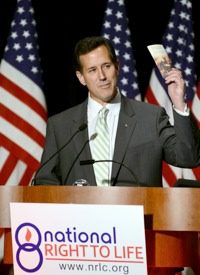
"This was a one-issue candidacy. He was a pro-choice candidate," Karl said. He then showed a video of Specter announcing his candidacy and taking an unequivocal "pro-choice" position.
"I want to take abortion out of politics, and leave moral issues, such as abortion, to the conscience of the individual," Specter said. "That is a matter to be decided by women, not by big government." A moment later, Karl showed another clip from the same event showing a beaming Santorum on the same platform shaking his colleague's hand.
"You were — you were probably his — maybe his most prominent supporter," Karl reminded Santorum. "Why did you support Arlen Specter for President?"
"Well, you know, when your colleague is running for office, and you know, I was his colleague in the United States Senate. He asked me to stand with him," Santorum explained. "That certainly was not one of my prouder moments I look back on. But look, you know, you work together as a team for the state of Pennsylvania. And I felt that Senator Specter had stood up and supported me when I was running in 1994, and I did likewise. I certainly knew that Arlen Specter was going nowhere. I certainly disagreed with a lot of things that he said, and it was something I look back on and wish I hadn't done."
Santorum's list of publicly acknowledged regrets has been growing along with his impressive streak of primary and victories in recent weeks. In the Arizona debate on February 22, he described his 2001 voted in favor of the education reform bill called the No Child Left Behind Act as something that "went against the principles I believed in." At the same time, he attempted to justify it in much the same terms he used to explain his support of the Specter presidential campaign. The bill, the centerpiece of President George W. Bush's domestic agenda, was something the Republican leadership wanted passed and "you know, when you're part of the team, sometimes you take one for the team, for the leader," he said, prompting some booing from the audience in Mesa.
Santorum has also had to explain his seemingly enthusiastic endorsement of Mitt Romney's 2008 presidential campaign, an endorsement that is something of an embarrassment to him now when he is trying to catch the former Massachusetts Governor in the race for delegates at the nominating convention. According to CBS News' count of delegates won, Romney leads all GOP contenders with 493 delegates, well ahead of second-place Santorum with 218.
Whether he knew it in 1996 or not, Santorum has well described Specter's prospects in that presidential campaign, since the Pennsylvania Senator dropped out before the first 1996 caucus or primary. Still, Santorum's admission that he endorsed a candidate he knew "was going nowhere" might cause some voters to wonder about the value of his endorsements and the measure of his commitments.
Santorum makes no apology, however, for his support of Specter's reelection bid against pro-life conservative Pat Toomey in the 2004 Senate primary. Specter had the backing of the Bush White House and the entire Republican establishment in that intra-party battle, and Santorum has justified his support by saying Specter had the better chance of defeating the Democrat and helping the GOP win a Senate majority and control of the chairmanships, including the chair of the Judiciary Committee for Specter. Specter had supported a ban on partial-birth abortion, said Santorum, who also claimed he had received in private a pledge from his Senate colleague that he would vote to confirm President Bush's picks to fill openings on the Supreme Court, a claim Specter has flatly denied. Santorum has yet to show any awareness of the ethical implications of asking a fellow Senator to trade his vote on yet unknown Supreme Court nominees for help in his election campaign.
Specter won that election, but switched parties in 2009 and lost his bid for reelection in a Democratic primary the following year. Pat Toomey, the Republican he defeated in the 2004 primary, won the 2010 election. But Santorum’s alliance with his former colleague still dogs Santorum in his current presidential campaign. The Romney campaign began last month running "Rick and Arlen" ads in an effort to dissuade conservative, pro-life voters from supporting the former Senator. Santorum, meanwhile, likes to point to Romney's record as Governor of Massachusetts.
"By the way, I just want to add that when I was standing up behind Arlen Specter, Mitt Romney was pro-choice," Santorum said on Sunday's This Week show. "Mitt Romney was giving money to Planned Parenthood and was out there talking, being — echoing the same themes, by the way, that Arlen Specter was echoing." Romney, however, has since had what he describes as a conversion on the abortion issue and now takes a "pro-life" stand.
Santorum, while one of the Senate's leading abortion foes, voted for bills that included funding of Planned Parenthood, the nation's foremost abortion provider. What's more, Romney's record as Governor was well known to Santorum when he endorsed his current rival in the 2008 campaign over both Arizona Senator John McCain and former Arkansas Governor Mike Huckabee. That was well after Romney had enacted the "Romneycare" health insurance legislation in Massachusetts that became the model for the "ObamaCare" plan that all the GOP candidates are in favor of repealing. And it was long after Romney had staked out his earlier position in favor of legalized abortion and his support of "gay rights." Yet Santorum, who said on Sunday there is little difference between Romney and Obama, had this to say about his rival four years ago:
Governor Romney is the candidate who will stand up for the conservative principles that we hold dear. He has a deep understanding of the important issues confronting our country today, and he is the clear conservative candidate that can go into the general election with a united Republican Party.
"I made, I hate to say it, a calculated political decision that Romney was the stronger horse and had a better chance to win Super Tuesday with the resources he had," Santorum said earlier this year, when asked about that endorsement. Maybe so. But if Santorum really thought Romney was the "stronger horse" at the time, maybe he should stay away from the racetrack.
"I endorsed him actually seven days before he dropped out of the race," the former Senator recalled.
Photo of Rick Santorum: AP Images


